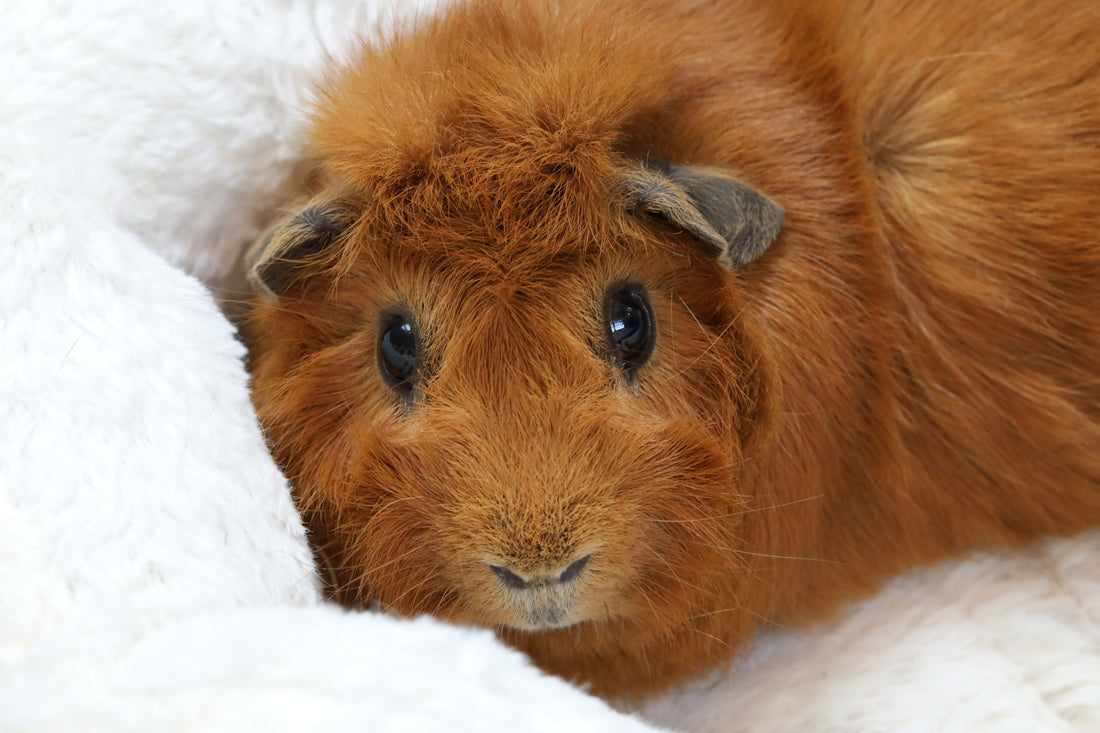
Guinea pigs have special dietary needs that must have sufficient vitamin C in their diets. You should feed your guinea pigs a diet that is as healthy as possible to avoid unnecessary trips to the vets and help them live long and healthy lives.
The wrong diet can lead to all sorts of health problems, including dental disease and problems with their digestive system. It is important to strike the right balance when feeding your guinea pig to give them the best nutrition.
Guinea pigs need lots of good quality foods to give them all the nutrients they need. However, at least 80% of a guinea pigs diet should be high quality, dust extracted feeding hay or fresh grass.
We’ve got some great tips on what the best hay for guinea pigs is, and why feeding your piggies quality hay should make up the majority of your furry friend's diet for keeping your guinea pig healthy in our guinea pig feeding guide.
Read on to discover the best ways for keeping your guinea pig healthy through their diet.
The ideal diet for your guinea pigs
Guinea pigs are herbivores, meaning they only eat plant-based food.
A guinea pig’s diet is similar in many ways to a rabbit’s with a few changes. Like rabbits, your piggy friends are grazers and naturally only eat grass, herbs and some plants like dandelion and groundsel.
In addition to keeping your guinea pig’s digestive system in order, it is important to remember that quality hay is an essential source of fibre and is great for wearing your guinea pigs teeth down which are always growing. This is why hay and grass are really important for your guinea pigs diet, especially premium quality Timothy Hay.

Do guinea pigs need vitamin C like we do?
We know that vitamin C is good for us humans, and it’s just the same for our piggy friends. This vitamin is essential because it is used to make collagen that is responsible for healthy joints, skin, gums, and is also used in wound healing.
What’s more, it is vital that our immune system functions correctly and helps us to fight any illnesses. Given all the benefits, it is very important for our health.
However, how come we only talk about vitamin C for guinea pigs and not our other furry friends? This is since most other pets can make their own vitamin C in their bodies. Rabbits, hamsters, gerbils and our other four legged friends don’t have to worry about how much of this vitamin they get in their diet.
What happens if my guinea pig has a vitamin C deficiency
Since vitamin C is essential for so many different parts of the body, there are a whole range of health problems your guinea pig could get if they don’t receive a diet that contains vitamin C.
You might start to see that your guinea pig has a poor coat, ulcers on their skin or gums, diarrhoea, dental problems, and swollen feet or joints. They also might seem poorly and go off their food.
The general health term for guinea pig vitamin C deficiency is ‘scurvy’. To avoid symptoms of scurvy, your piggy needs to get enough vitamin C in their diet.
What foods can guinea pigs eat that provide them with vitamin C?
Good quality hay should make up the majority of guinea pigs' diet and a fresh supply should be available at all times. Small amounts of fresh grass and vegetables should be given as frequently as possible and ideally daily to help offer a good source of vitamin C.
A teacup sized amount of fresh greens per day are a great source of vitamin C. It is important to remember to only give your guinea pig fresh food : root vegetables like carrots, or fruit such as apples.
Discover our very tasty Timothy Hay mixed with Carrot & Apple popular with guinea pigs.

When giving your guinea pigs fruit, only do this in small amounts, such as an apple quarter as a special treat and never give citrus fruits.
Overfeeding your guinea pigs with fresh fruit can seriously damage your piggies teeth, due to the number of natural sugars that are found in these types of foods. This is why grass and quality hay like Timothy Hay is so important to feed your guinea pigs for keeping them healthy all around.
Pellets are another good source of vitamin C. If pellets are your chosen vitamin C food a fresh portion should be available daily since vitamin C is destroyed over time when exposed to air so don’t just keep topping up the bowl of pellets. Wait until your piggy has eaten them all, or if they haven’t eaten their daily allowance then throw them away and give another portion of fresh pellets the next day.
Growing, pregnant, nursing or underweight guinea pigs may need more vitamin C. Please speak to your vet if your guinea pig fits in any of these categories because they will be able to advise you about how to provide the best diet for your piggy.
What’s the difference between bedding hay and feeding hay?
Although they’re both essentially dried grass, bedding hay and feeding hay are very different. Feeding hay has more nutrients for keeping your guinea pig’s digestive system healthy. It is also fresher, usually greener, and tastier than bedding hay.
Bedding hay is usually quite dry, making it ideal for keeping cosy but not so great for nibbling. It won’t do them any harm if they have a nibble, as long as they have plenty of quality feeding hay and water available too.
Constant access to fresh, clean drinking water from a water bottle with a metal spout is essential alongside your guinea pigs food, especially hay because it can be dry. A bottle is best because it is more hygienic than a bowl which can become contaminated with urine and faeces. It is important to check that your furry friend is using the bottle, because if they are used to drinking from a bowl they may find it difficult when changing to a bottle.
If your guinea pig starts drinking more water than normal, speak to your vet immediately because this could be a sign that they are not well.
Find out more about the Newhay Way of farming and how we produce the best quality Timothy Hay for your guinea pigs.

